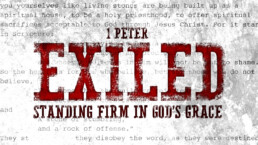That Extra Seat...
The below blog post from The Village Church was too good and convicting not to repost:
We’ve all done it. We shuffle down a row of chairs and, just before we arrive at a person, we stop one chair short. We leave an empty seat between us and the other person, secretly hoping an usher won’t ask us to “scoot in.” What does that empty seat say? Why are we compelled to leave that “safe seat” between us and others?
I get it. Trust me; I am the king of the buffer zone. The introvert in me sees that empty chair as an invisible wall that separates me from the other person. If I sit in it, we might touch, we might speak, they might be annoying, and I might appear to be socially inept.
But, if the Recovering Redemption series has been prodding me in one specific direction, it has been to pull back the veil that covers the motives and intentions of my heart. So, let’s look at something that is so concrete and practical it almost appears mundane. What does that empty seat say?
It says we want convenience.
When we leave that empty seat, we are preserving a ring of comfort for our convenience. If we sit next to someone, our space will be invaded. We feel really comfortable in our personal bubble. It smells like we want it to smell, it is the right temperature, and it always has the right amount of wiggle room.
Paul seems to think that “if there is any encouragement in Christ, any comfort from love, any participation in the Spirit, any affection and sympathy…” his joy will be complete in seeing the believers share the “same mind, having the same love, being in full accord and of one mind” (Phil. 2:1-2). If we are unwilling to literally draw “near” to one another in corporate worship, I seriously doubt the depth of our willingness to draw “near” to one another in love, participation in the spirit, affection and sympathy.
That seat is an opportunity for you to draw near to one another. Let that nearness remind you that as part of the same body of believers, you are to be of the “same mind, same love, in full accord and of one mind.” Convenience is a weak substitute for communal worship. Participate in the Spirit together.
It says we want autonomy.
Ever since Adam and Eve in the Garden, mankind has pursued autonomy from God, which has led us to pursue autonomy from one another.Their perfect unity shattered by sin, Adam and Eve begin to seek separation from God and each other—in the way they cover their bodies, in the way they hide from God, in the way they shift blame.
If you sit next to that person, you might lose your ability to maintain separation. Conversation, touch and community might emerge as two “images of God” sit shoulder to shoulder in a row of seats in a worn-out building.
Do we view the person next to us as an opportunity to be surprised by God’s grace? As C.S. Lewis reminds us, “There are no ordinary people. You have never talked to a mere mortal…it is immortals whom we joke with, work with, marry, snub, and exploit—immortal horrors or everlasting splendors.”
Why not take an opportunity this Sunday to lay down your desire for autonomy and meet an immortal?
It says we want worship on our terms.
Far too often, we approach corporate worship with the hope that it will meet all our needs. You want to hear that one song you love, you want the preacher to be particularly funny without sacrificing insight, and youwant to interact with people who will match your moods and delight your eyes. We want worship on our terms. But this approach is flawed.
You need to know that the seat you sit on this Sunday is not a right. You have brothers and sisters in Christ who gather in mud huts, sit in basements and listen for knocks and police shouts as they worship the Lord Jesus. Gathering together for corporate worship is costly for them, yet they know the comfort of the Spirit. They have found that Christ is no less worthy of worship when shoulders rub, babies cry, and the room is hot with the breath of a packed crowd.
When you pursue worship on your own terms, you make yourself the object of worship. Let the person next to you and behind you and in front of you remind you that individual preferences have no place in the corporate gathering of the saints.
The desire to have convenience, autonomy and worship on our own terms keeps the empty seat firmly in place, week after week. Set aside these lesser things for the joy of drawing near. Fill the empty seat. Allow the proximity of your fellow worshipers to remind you each week that we are one body made of many connected parts, for whom personal relationship with God manifests as corporate relationship with others. Brothers and sisters, scoot in.
Thanksgiving Food Drive
‘“Which of these three, do you think, proved to be a neighbor to the man who fell among the robbers?’ He said ‘The one who had mercy on him.’ Jesus told him, “Go and do likewise.”’ Luke 10:36-37
In Luke 10, the expert in the law, in his self-righteousness, wanted to know who his neighbor was so that he could check off the box of “loving his neighbor as himself”. Through the Parable of the Good Samaritan however Jesus teaches that it is not as simple as that. Each person is our neighbor and it is our calling as Christians to love everyone as Christ loved us.
On Saturday, November 2, Restoration Church members took time to pass out empty bags of food in Northwest DC to collect food for families in Southeast that they may never see. Washington D.C. is a city of marble and cardboard and each one of its citizens is a neighbor that Jesus has commanded us to love. On Tuesday we dropped off 80 bags of groceries, diapers, and cleaning supplies to be donated to the families and individuals that come to A Wider Circle. The average income of a family at A Wider Circle is 12,000 for a family of four and this includes all forms of public assistance as well as income. Many kids depend on school lunches as their mean source of food and will not eat over enough over the weekend when school is out.
The food donated by Restoration Church will be going to two different places. It will help to provide Thanksgiving baskets for the dozens upon dozens of family who are dependent upon A Wider Circle for a Thanksgiving meal. It will also be loaded onto one of our box trucks for our monthly trip to Southeast Washington D.C. to pass out to Emmanuel Baptist Church, Hope Village, and other surrounding communities. As someone who works with the families when they come in to A Wider Circle, I (Megan T.) wanted to thank you all for the ways that you are caring for your neighbor through your prayers, time, and donations. Yesterday I handed a formerly homeless veteran a bag containing Kleenex, paper towels, toilet paper, rice, beans, peaches, pasta, and green beans and it was priceless the way that his face lit up.
Love Earnestly
Yesterday's sermon from 1 Peter 1:23-2:3 challenged us to "love one another earnestly from a pure heart." But what about the unloveable...do we have to love them too? Yes; here are 10 reasons we must do so:
- God loves them.
- We show the power of the gospel by loving all people.
- We live in Christian obedience when we show love toward all.
- Some unlovable church members need Jesus.
- Some unlovable church members are undiscipled believers acting like undiscipled people.
- Love motivates our praying for unlovable church members.
- Loving unlovable church members is an act of faith.
- Unlovable people are often loners, and loners need help winning spiritual battles.
- Only genuine love allows us to carry out church discipline when needed.
- We are all sometimes unlovable.
What I Learned From Missing Church
I (Joey) recently read a blog about what we learn from missing church for several weeks in a row. While the whole article is well worth the read, here are is a short summary:
"I missed church for five weeks in a row recently because of circumstances surrounding the birth of my second child. We have a healthy baby girl now, and all is well. And I wish I didn’t have to miss so much church. However, God used that season of being away to remind me how valuable it is to gather with the body of Christ weekly. Consider the following:
-Preaching complements personal Bible study in the life of a believer.
-In a local church, members demonstrate a special type of kindness to one another.
-Singing corporately with other believers nurtures the Christian’s soul.
-Giving is an act of worship, not merely a discipline.
When Your Plans Fail
Disappointment--What is Necessary--God's Patience
by John Newton
August 17, 1767
It is indeed natural to us to wish and to plan, and it is merciful in the Lord to disappoint our plans, and to cross our wishes. For we cannot be safe, much less happy, but in proportion as we are weaned from our own wills, and made simply desirous of being directed by His guidance. This truth (when we are enlightened by His Word) is sufficiently familiar to the judgment; but we seldom learn to reduce it to practice, without being trained awhile in the school of disappointment.
The schemes we form look so plausible and convenient, that when they are broken, we are ready to say, "What a pity!" We try again, and with no better success; we are grieved, and perhaps angry, and plan out another, and so on; at length, in a course of time, experience and observation begin to convince us, that we are not more able than we are worthy to choose aright for ourselves. Then the Lord's invitation to cast our cares upon Him, and His promise to take care of us, appear valuable; and when we have done planning, His plan in our favour gradually opens, and he does more and better for us than we either ask or think.
I can hardly recollect a single plan of mine, of which I have not since seen reason to be satisfied, that had it taken place in season and circumstance just as I proposed, it would, humanly speaking, have proved my ruin; or at least it would have deprived me of the greater good the Lord had designed for me. We judge of things by their present appearances, but the Lord sees them in their consequences, if we could do so likewise we should be perfectly of His mind; but as we cannot, it is an unspeakable mercy that He will manage for us, whether we are pleased with His management or not; and it is spoken of as one of his heaviest judgments, when He gives any person or people up to the way of their own hearts, and to walk after their own counsels.


